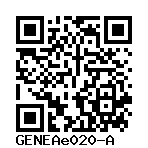GENEA019
GENEAe020-A
General
Donor Information
General Donor Information |
|
| Sex | female |
Phenotype and Disease related information (Donor) |
|
| Diseases | No disease was diagnosed.
|
Donor Relations |
|
| All cell lines of this donor's relatives |
Has sister:
|
External Databases (Donor) |
|
| BioSamples | SAMEA104013011 |
Ethics
| Was the embryo established purely for research purposes? | No |
| Have both parents consented to the use of the embryo for ESC derivation? | Yes |
| Has informed consent been obtained from the donor of the embryo/tissue from which the pluripotent stem cells have been derived? | Yes |
| Was the consent voluntarily given? | Yes |
| Has the donor been informed that participation will not directly influence their personal treatment? | Yes |
| Can you provide us with a copy of the Donor Information Sheet provided to the donor? | Yes |
| Do you (Depositor/Provider) hold the original Donor Consent Form? | No |
| If you do not hold the Donor Consent Form, do you know who does? | No |
| Alternatives to consent are available? | Yes |
| Alternatives to consent | Genea019 ( outgrowth cells from a sibling embryo to Genea020) was derived from embryonic outgrowth cells, originally developed for karyotyping, not from the embryo with fully informed consent. the PGD was performed on an undisclosure basis.only one document can be added here so other document will be emailed. |
| Alternative consent approval number | |
| Has the donor been informed about how her/his data will be protected? | Yes |
| Please indicate whether the data associated with the donated material has been pseudonymised or anonymised. | pseudonymised |
| Does consent explicitly allow the derivation of pluripotent stem cells? | Yes |
| * Does consent expressly prevent the derivation of pluripotent stem cells? | No |
| Does consent prevent CELLS DERIVED FROM THE DONATED BIOSAMPLE from being made available to researchers anywhere in the world? | No |
| How may genetic information associated with the cell line be accessed? | No information |
| Will the donor expect to receive financial benefit, beyond reasonable expenses, in return for donating the biosample? | No |
| Has a favourable opinion been obtained from a research ethics committee, or other ethics review panel, in relation to the Research Protocol including the consent provisions? | Yes |
| Name of accrediting authority involved? | GENEA HREC |
| Approval number | Meeting 13/09/2005 |
| Has a favourable opinion been obtained from a research ethics committee, or other ethics review panel, in relation to the PROPOSED PROJECT, involving use of donated embryo/tissue or derived cells? | Yes |
| Name of accrediting authority involved? | GENEA HREC |
| Approval number | Meeting 13/09/2005 |
hESC Derivation
| Date of derivation | 2007-12-18 |
| Supernumerary embryos from IVF treatment? |
Yes
Separation of research and IVF treatment?
Yes |
| PGD Embryo? |
Yes |
Culture Conditions
| Medium |
Other medium:
Base medium: KO-DMEM
Main protein source: Knock-out serum replacement Serum concentration: 20 % Supplements
|
Characterisation
Analysis of Undifferentiated Cells
| Marker | Expressed | Immunostaining | RT-PCR | Flow Cytometry | Enzymatic Assay | Expression Profiles |
| NANOG |
Yes |
|||||
| POU5F1 (OCT-4) |
Yes |
|||||
| TRA 1-60 |
Yes |
|||||
| SSEA-4 |
Yes |
| Pluripotency Score | Novelty Score | |
| 22.97 | 1.42 |
Teratoma positive, Alkaline Phosphatase stain positive.
Differentiation Potency
Genotyping
Karyotyping (Cell Line) |
|
| Has the cell line karyotype been analysed? |
Yes
46,XX no abnormalities detected
Passage number: 36
|
Other Genotyping (Cell Line) |
|


Login to share your feedback, experiences or results with the research community.